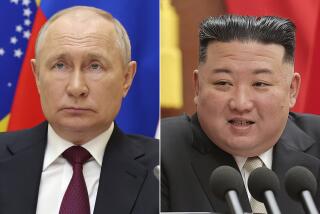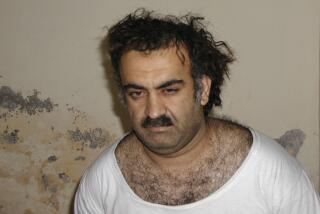U.S. Says Iraq Letter Sought Al Qaeda Aid
- Share via
BAGHDAD — U.S. forces have intercepted correspondence believed to have been written by a terrorist operative seeking Al Qaeda’s help in inciting violence between Shiite and Sunni Muslims in Iraq, the U.S. military confirmed Monday.
The letter, believed to have been written in Iraq, outlines a plan for “provoking ethnic sectarian warfare ... in the hope of tearing this country apart,” said Dan Senor, a spokesman for the Coalition Provisional Authority.
The discovery of the 17-page letter was first reported Monday by the New York Times.
“We believe the report and document are credible. We take the report seriously,” said Brig. Gen. Mark Kimmitt, a U.S. military spokesman. Kimmitt said the letter would be made public.
The letter, military officials believe, was written by Abu Musab Zarqawi, a Jordanian suspected of having ties to Al Qaeda. Reports indicated that the letter was intended for senior leaders of Osama bin Laden’s terrorist network.
“We are persuaded that Al Zarqawi was the author of the letter. It is our understanding that this letter was being taken by a courier outside this country for delivery abroad,” Kimmitt said.
Senor said the document detailed “a strategy of provoking violence, targeted at the Shiite and the Shiite leaders in the hope that it will result in reprisals against other ethnic groups within the country.”
U.S. authorities blame Al Qaeda, loyalists of deposed Iraqi leader Saddam Hussein and other groups for the ongoing attacks on American troops.
On Monday, two U.S. soldiers were killed and five wounded in an explosion as they disposed of weaponry in Sinjar, about 75 miles west of the northern city of Mosul. The blast, which officials said did not appear to involve hostile action, brought the total U.S. death toll in Iraq to more than 530 since the March invasion, according to an Associated Press tally.
U.S. officials said the purported letter from Zarqawi was on a computer disk carried by Hassan Ghul, according to wire services, allegedly a senior Al Qaeda operative who was arrested last month by Kurdish forces as he tried to enter Iraq from Iran.
The New York Times indicated that the letter expressed concerns that religious extremists were failing to attract support in Iraq. The document requested help in directing attacks against Iraq’s Shiite majority in an effort to trigger counterattacks against Sunni Muslims, sparking a “sectarian war” that would draw Iraqi Sunnis closer to the extremists.
“In many ways, this guy is disappointed at his lack of success,” Kimmitt said. “It is almost a sign of desperation.”
Middle East experts said the letter’s contents were not surprising. “Removing Saddam Hussein created a power vacuum that Al Qaeda feels they can use to enter Iraq,” said Charles Pena of the Washington-based Cato Institute. “Insurgents try to recruit Al Qaeda so they have a ready supply of suicide bombers, and Al Qaeda comes to Iraq thinking it’s a great new place to spread radical Islam.”
More to Read
Sign up for Essential California
The most important California stories and recommendations in your inbox every morning.
You may occasionally receive promotional content from the Los Angeles Times.










